State Minister Suzuki’s Visit to Sri Lanka, Thailand, and the Philippines (February 18–February 22, 2024)
The State Minister of Agriculture, Forestry, and Fisheries, Mr. Suzuki, made an official visit to the following places: the Democratic Socialist Republic of Sri Lanka from February 18 to February 21, the Kingdom of Thailand on February 21, and the Republic of the Philippines from February 21 to February 22.
In Sri Lanka, he attended the 37th FAO Regional Meeting for Asia and the Pacific and delivered speeches on behalf of Japanese government. He had bilateral meetings with FAO and other dignitaries.
In Thailand, he met with officials from the ASEAN+3 Emergency Rice Reserve (APTERR) Secretariat, while in the Philippines, he met with a dignitary from the Philippine National Food Authority.
1. Visit to Sri Lanka
State Minister Suzuki attended the 37th FAO Regional Meeting for Asia and the Pacific and delivered the following speeches at each session: He met with the FAO and dignitaries from participating countries.
Plenary Session (speeches by national government representatives on national and regional priorities)
<Remarks by State Minister Suzuki>
1. The prices of food and agricultural inputs remains high, being affected by the COVID-19 pandemic and regional
conflicts. Russia's illegal war of aggression against Ukraine exacerbated the global food crisis; especially that of
vulnerable people. In addition, addressing climate change and biodiversity loss are also our top priority.
With that, we need to accelerate food systems transformation more than ever, towards resilient and sustainable
agriculture and food systems.
2. Japan aim to ensure adequate food for all at any time, either in the time of peace or emergency, and to secure
the stable food supply through increasing domestic production and ensuring stable food imports.
3. Japan is paving the way to sustainable food and agriculture sectors based on the "Strategy for Sustainable Food
Systems," called MIDORI", to achieve both productivity growth and sustainability, through innovation.
4. Japan considers there is no one-size-fits-all solution. Climate conditions, geographical features and faming
structures of respective countries need to be considered and should be employed as each country's
advantage. With this perspective, Japan launched the "ASEAN-Japan MIDORI Cooperation Plan" with ASEAN
countries, and announced the technical catalog, which complies with Japan’s agricultural know-how and
is applicable to any other regions as a form of cooperation in this field.
5. Import restrictions on Japanese food product, introduced after the Great East Japan Earthquake and
the discharge of Advanced Liquid Processing System treated water, are still maintained by some countries,
without scientific evidence. Japan would like to express that these measures are unacceptable for Japan at all.
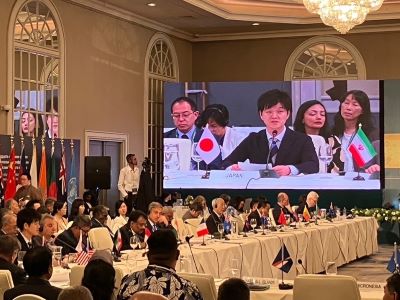
State Minister Suzuki delivers a speech
at the Plenary Session
Ministerial Roundtable (Food Security and Nutrition in the Asia-Pacific Regions)
1. Several countries have put export restrictions against the historic surge of high prices for food and agricultural
inputs. Export restrictions would have a significant impact on global food supply and demand not only in the
short term but also in the medium to long term.
2. He stressed the following outcomes of the G7 Agriculture Ministers’ Meeting in Miyazaki and the G7 2023
Hiroshima summit:
2.1 Improving agricultural productivity in sustainable manner
2.2 Maximizing the use of existing domestic agricultural resources.
2.3 Utilizing all forms of innovation to be put in action in a way that benefits all people
3. He emphasized the importance of public-private partnerships involving public research institutions and private
companies for this purpose.
4. Stronger partnership among international organizations related to food including FAO and the environment will
be all the more important for the transformation toward resilient and sustainable agriculture and food systems.
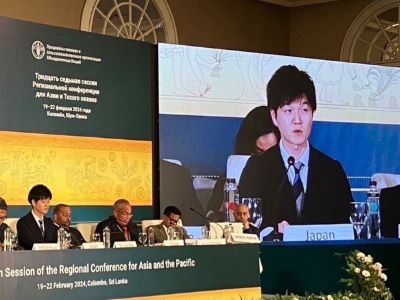
State Minister Suzuki delivers a speech
at the Ministerial Roundtable
Bilateral Meetings with Dignitaries
State Minister Suzuki met with FAO Director-General, Dr. QU Dongyu. He reaffirmed Japan’s commitment to build a sustainable agriculture and food system in the Asian monsoon region in accordance with the Strategy for Sustainable Food Systems, “MIDORI,” and to continue cooperation with FAO in this matter. He also exchanged opinions with Dr. QU on food security and other challenges and collaborations in policies on agriculture, forestry, and fisheries. On the sidelines of the FAO event, he also had bilateral meetings with both Dr. Md. Abdus Shahid, the Minister of Agriculture, Government of Bangladesh, and Mr. Mahinda Amaraweera, the Minister of Agriculture and Plantation Industries of Sri Lanka, and discussed future cooperation.
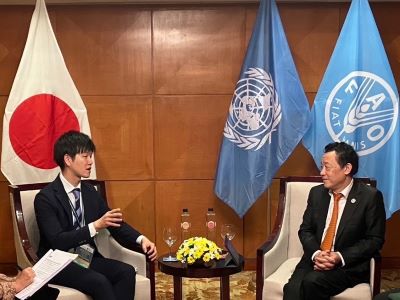 Bilateral Meeting with FAO Director-General,
Bilateral Meeting with FAO Director-General,
Dr. QU Dongyu
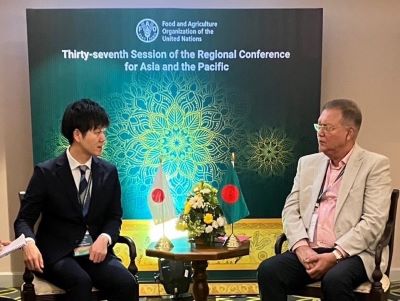 Bilateral Meeting with Dr. Md. Abdus Shahid,
Bilateral Meeting with Dr. Md. Abdus Shahid,
the Minister of Agriculture of Bangladesh
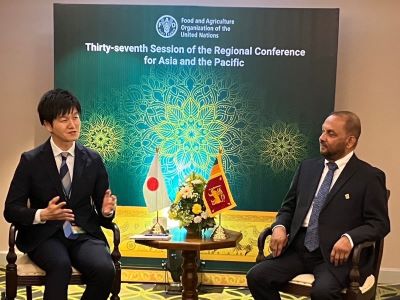
Bilateral Meeting with Mr. Mahinda Amaraweera,
the Minister of Agriculture and Plantation Industries
of Sri Lanka
In addition to the FAO meetings, State Minister Suzuki visited the IFAD’s project site and then exchanged opinions with local producers, operating organizations, and Japanese enterprises. He also visited a small Japanese food retailer, local Japanese restaurants where the owner is a Japanese Cuisine Goodwill Ambassador, and a youth educational center for human development in the agricultural field and exchanged views.
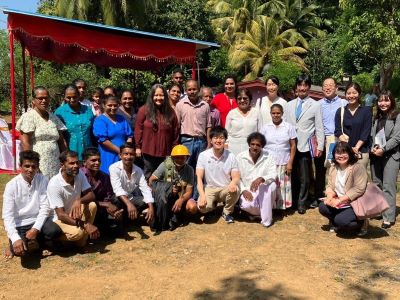 State Minister Suzuki's visit to the IFAD project site
State Minister Suzuki's visit to the IFAD project site
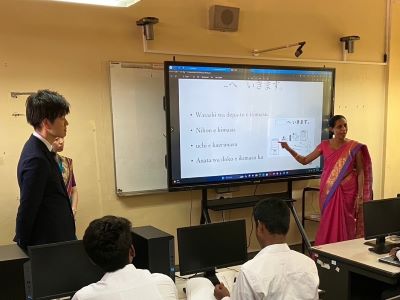 State Minister Suzuki's visit to the Center for
State Minister Suzuki's visit to the Center for
Education and Training of Youth
2. Visit to Thailand
State Minister Suzuki met with Dr. Choomjet Karnjanakesorn, General Manager of the APTERR Secretariat. They exchanged views on the current situation of Japan’s APTERR programme and the APTERR Council meeting to be held in Japan next year.
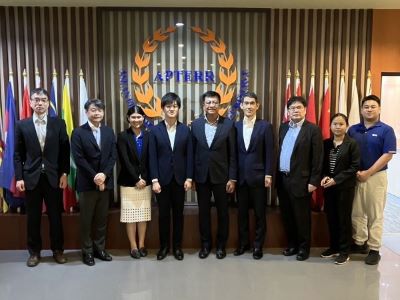
Group photo of State Minister Suzuki and
the Secretariat of the APTERR
3. Visit to the Philippines
State Minister Suzuki met with Mr. Roderico R. Bioco, Administrator of the National Food Authority of the Philippines. They exchanged views on the current situation and future prospects of Japan’s APTERR programme as well as the evaluation of the rice contributed by Japan. The Philippine side expressed gratitude for Japan’s continued support through APTERR activities. He also attended the meetings to exchange views with companies which are handling Japanese food products. In addition, he visited the retailers of Japanese food products and exchanged opinions with them.
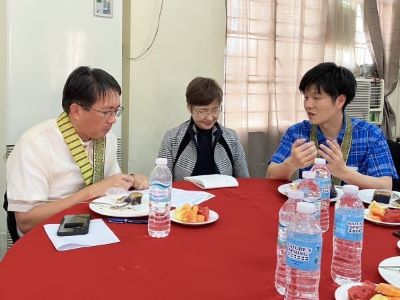 Discussion with Mr. Bioco, Administrator of the NFA
Discussion with Mr. Bioco, Administrator of the NFA
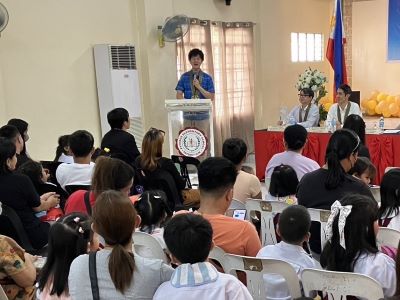 State Minister Suzuki exchanges views on Japan's
State Minister Suzuki exchanges views on Japan's
APTERR rice at informal meeting
Contact
For inquiries about the 37th FAO Regional Meeting for Asia and the Pacific and bilateral meetings with dignitaries,
please contact the International Strategy Division, Export and International Affairs Bureau at +81-3-3502-8498.
For inquiries about APTERR-related meetings, please contact the Grain Trade and Operation Division, Crop
Production Bureau at +81-3-3502-8111.




